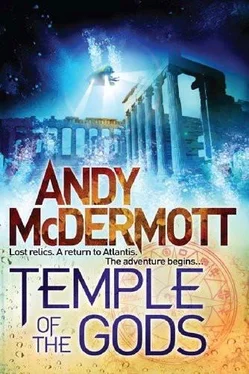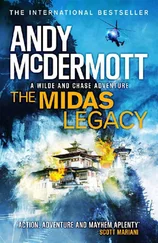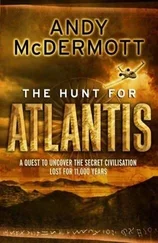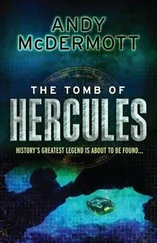‘I, uh — I have been memorising the catacombs,’ said Agnelli.
Nina wondered why he seemed so nervous about the admission, but Belardinelli’s irritable words gave her an explanation. ‘Yes, he is always wandering off when I need him!’ He returned the card to the drawer, giving the computer a contemptuous glare. ‘Still, at least he is learning for himself. Better than being told the answer by a machine. I never use it myself. If God had meant machines to think for us, why give us brains?’ He jabbed distastefully at the mouse on the left of the keyboard.
‘The text?’ prompted Popadopoulos.
The old man grunted in annoyance. ‘Down here.’
He led the others into one of the tunnels. Unlike the route from the elevator, these were more than mere access passages. Carved into the walls were long, low niches, stacked as many as four high. Loculi , Nina knew: burial nooks, in which the ancient Christians had placed the bodies of their dead.
There were no corpses present now, to her relief. Instead, the niches were home to shelves holding wood and metal boxes, carefully wrapped bundles of thick cloth, sealed glass tubes containing rolled papers and parchments. A great repository of ancient knowledge.
Stolen knowledge. Not even famous historical names had been safe from the Brotherhood’s attentions; one of the items in the archive had been Hermocrates , the lost dialogue of the Greek philosopher Plato. She wondered what secrets were contained in the documents she passed — and how many people had been killed for them.
But there were more important issues than her disgust at the Brotherhood. They went deeper into the catacombs, Belardinelli turning without hesitation at each junction to lead them to their destination. ‘Here,’ he said, stopping at a larger, arched niche, reliefs of figures and Latin text carved into the stonework. ‘The fourteenth arcosolium.’
Within the ornate burial nook was a tall grid of shelves, upon which were dozens of cloth-wrapped objects. Books, but very large ones; Nina had seen a similar example when Popadopoulos brought the original text of Hermocrates to her in New York. The ‘pages’ were actually sheets of glass, the fragile parchments carefully preserved between them and the whole thing bound together by metal.
Belardinelli squinted up at one of the higher shelves, then looked round and spotted a little stepladder not far away. He waved for Agnelli to bring it. ‘Shall I get the book for you?’ the youth asked as he set the ladder in place.
‘No, no,’ the bearded man insisted. He ascended the steps, stretching to reach the uppermost shelf. He had to hold on to the old wood with his left hand for support, leaving a print in the dust as he strained to pull the heavy book from its resting place. Nina cringed as it tipped over the edge, its weight almost too much for Belardinelli to support with one hand, but he managed to catch it before it fell.
He clambered back down. ‘This is what you wanted to see,’ he told Nina, unfolding the thick cloth. Compared to the other wrapped volumes, there was surprisingly little dust. The cover was of thick burgundy leather, framed in scuffed brass. ‘The texts of Kallikrates.’
‘I’ve never heard of him,’ she admitted.
‘You wouldn’t have,’ said Popadopoulos. ‘The Brotherhood made sure of that. But he was a student of Theophrastus—’
‘One of Plato’s students.’
That seemed to elevate her, very slightly, in Belardinelli’s eyes. ‘Yes. Kallikrates was intrigued by the history of the wars between Athens and Atlantis. These texts,’ he tapped the book, ‘contain his writings on the subject.’
‘Well, let’s see what he said about Nantalas, shall we?’ said Nina.
Belardinelli placed the book on the stone slab at the base of the arcosolium and opened it carefully, the binding creaking as he turned each glass ‘page’. At a particular one, he put his reading glasses back on. ‘This is it.’
A discoloured sheet of parchment was pressed between the glass plates, the bottom part raggedly torn away and the remainder showing clear signs of damage from water and time. Tightly packed Greek text was written in faded brown ink. ‘What happened to the rest of it?’ Nina asked.
‘Nobody knows,’ the old man replied. ‘When Kallikrates died, there was a dispute over his possessions. The Brotherhood took these texts from one of his brothers, but the rest were lost.’
She imagined that the taking had been by force, but was more eager to read the ancient document than criticise. Her parents had taught her Greek as a child, so the only problems were the occasionally poor legibility of the text and the low light. From what she could tell, the previous part of Kallikrates’ writings concerned the Atlantean royal court, before discussing the high priestess’s part in its affairs. ‘Seems she was quite the warmonger,’ she said. Most of her supposed prophecies were more like thinly veiled entreaties to lead Atlantis into yet another battle against its many enemies.
‘All Atlanteans are warmongers,’ said Belardinelli accusingly. ‘Violence is in their blood.’
‘And in the blood of their enemies too, apparently,’ she shot back. ‘Where’s the part about the statues?’
Belardinelli indicated a section lower down the page. Nina read it out loud. ‘“When Nantalas held the statues, a great light would fill the Temple of the Gods, giving the high priestess visions as the stone called out to her. She said that such visions let her see through the eyes of all the watching gods, and that she could feel all life in this world.” That’s what I…’
She tailed off, not wanting to let the members of the Brotherhood in on her secrets. ‘What I expected based on our new excavations,’ she continued, before quickly reading on until she found another relevant piece of text. ‘“The high priestess requested the presence of the king at the Temple of the Gods. She told him again that the power of the sky stone would make the empire invincible. When he demanded proof, she brought the statues together and touched them to the stone. The king was astounded when it…”’
That was the end of the text, nothing more than the occasional letter discernible at the torn bottom of the parchment. ‘That’s all there is?’ she asked Belardinelli.
‘Nantalas appears in a few other texts,’ he replied, ‘but only as a name — nothing more is said about her.’
She turned to Popadopoulos. ‘The Brotherhood is the only organisation that has this information, yes? There’s nobody else who might have copies of it, or another source?’
‘Not that I am aware of,’ he said.
‘And you haven’t shared anything from the archives with anybody but the IHA?’
‘We would not even have done that if we had not been forced,’ said Belardinelli, affronted.
‘Why are you asking?’ said the Greek.
‘Because,’ she said, ‘I think somebody has information about Atlantis that not even the Brotherhood of Selasphoros possesses.’
Belardinelli shook his head. ‘Impossible! The Brotherhood has been dedicated to its task for hundreds of generations. We have found everything there is to find about Atlantis.’
‘Except Atlantis itself,’ Nina reminded him. ‘You needed me to do that.’
The Italian seemed about to explode with anger, but Popadopoulos waved him down. ‘What are you suggesting, Dr Wilde?’
‘When I put the three statues together in Tokyo,’ she said, ‘I had… an experience.’
‘What kind of experience?’
‘Let’s just say that Nantalas might not have been a fraud. But the thing is, Takashi — the guy who had the statues — knew what to expect, as if he’d read this text.’ She indicated the parchment.
Читать дальше











